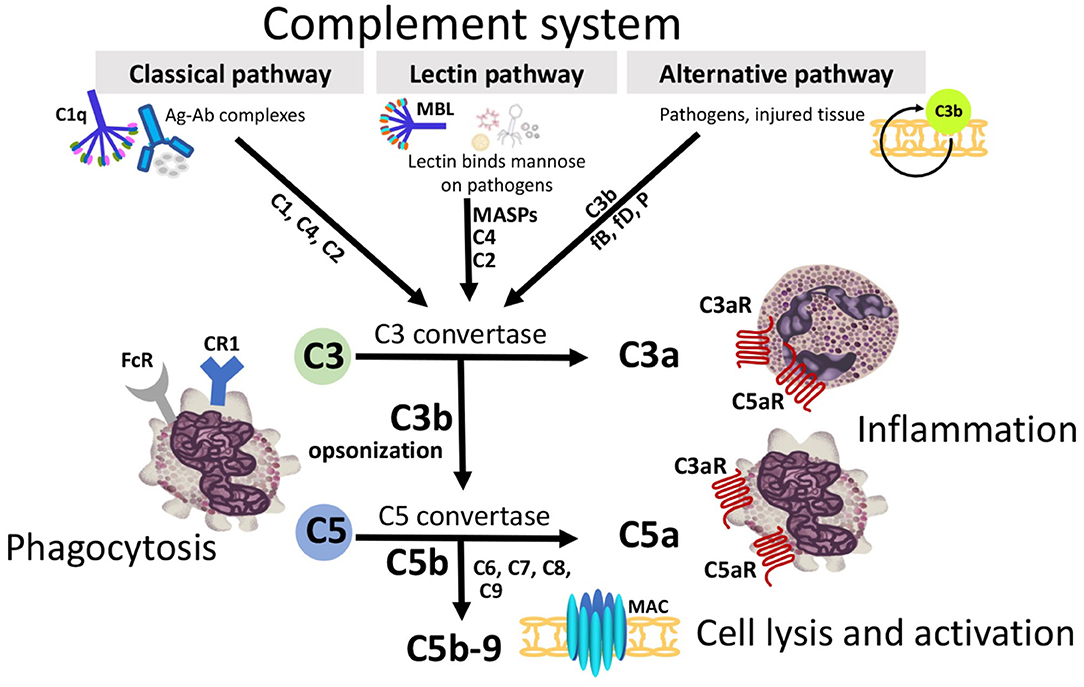Complement System (CS)

Complement System (CS)
Complement system (CS) is a crucial component of the innate immune response, consisting of a series of proteins that work together to enhance the ability of antibodies and phagocytic cells to clear pathogens from an organism. It plays a vital role in immune surveillance, inflammation, and the elimination of pathogens, as well as in the modulation of adaptive immunity.
Components of the Complement System (CS)
The complement system comprises over 30 proteins, primarily produced by the liver, which can be classified into three main pathways:
Classical Pathway:
- Activated by antibodies bound to pathogens or antigens. This pathway is critical for linking the adaptive immune response to innate immunity.
Lectin Pathway:
- Triggered by the binding of lectins (carbohydrate-binding proteins) to specific carbohydrates on the surface of pathogens. This pathway is similar to the classical pathway but does not require antibodies.
Alternative Pathway:
- Initiated directly on microbial surfaces in the absence of antibodies. This pathway provides a rapid response to invading pathogens.
Functions of the Complement System
Opsonization:
- Complement proteins coat pathogens, enhancing their recognition and uptake by phagocytes (e.g., macrophages and neutrophils), which leads to increased phagocytosis.
- Complement activation leads to the release of pro-inflammatory mediators that recruit immune cells to sites of infection or injury, promoting inflammation.
Cell Lysis:
- The formation of the membrane attack complex (MAC) can directly lyse pathogen cell membranes, leading to cell death.
Clearance of Immune Complexes:
- The complement system helps clear immune complexes from circulation, reducing the risk of autoimmune reactions and tissue damage.
Regulation of the Complement System
To prevent damage to host tissues, the complement system is tightly regulated by various proteins that inhibit complement activation at different stages. These regulatory proteins include:
- C1 inhibitor: Regulates the classical pathway.
- Factor H: Inhibits the alternative pathway.
- CD55 (decay-accelerating factor): Disrupts C3 convertase activity.
Role in Disease
Dysregulation or malfunction of the complement system can lead to a variety of diseases:
- Autoimmune Diseases: Overactivation can contribute to tissue damage in conditions such as systemic lupus erythematosus (SLE).
- Infectious Diseases: Impaired complement function can increase susceptibility to infections, especially with encapsulated bacteria.
- Inflammatory Disorders: Excessive complement activation is associated with chronic inflammatory conditions and tissue damage.
Conclusion
The complement system is an essential part of the immune response, providing a rapid and effective means to eliminate pathogens while also playing a role in regulating inflammation and linking innate and adaptive immunity. Understanding its functions and regulatory mechanisms is crucial for developing therapeutic strategies aimed at modulating immune responses in various diseases. At DrStemCellsThailand‘s Anti-Aging and Regenerative Medicine Center of Thailand, we leverage insights from immunology to optimize treatment protocols for our patients.
Consult with Our Team of Experts Now!
References
- The Complement System: Overview and Functions
This article discusses the components and mechanisms of the complement system in immune responses.
DOI: 10.1016/j.jdiacomp.2020.107646 - Regulation of Complement Activation
This review highlights regulatory mechanisms that control complement activation and prevent host tissue damage.
DOI: 10.1016/j.stemcr.2021.05.005 - Complement System Dysregulation in Autoimmunity
This study evaluates how dysregulation of the complement system contributes to autoimmune diseases and potential therapeutic approaches.
DOI: 10.1016/j.biopsych.2018.03.006















